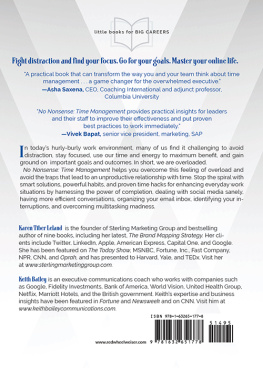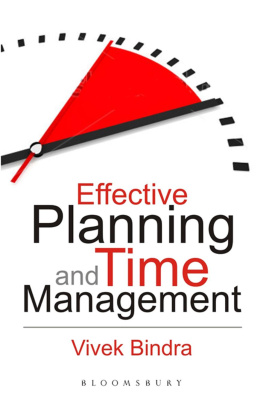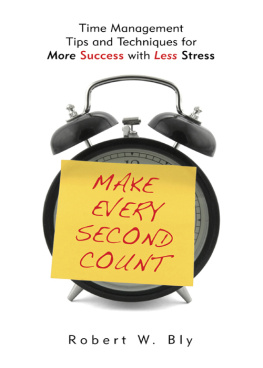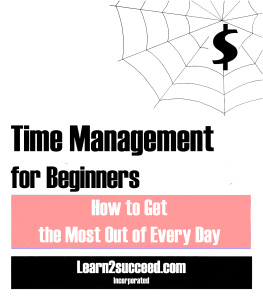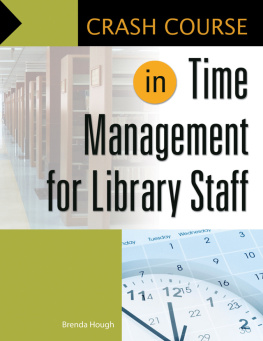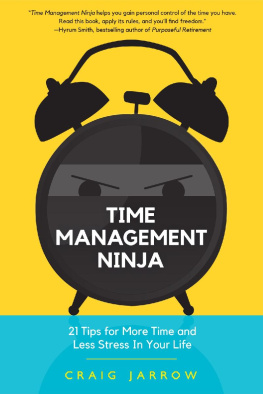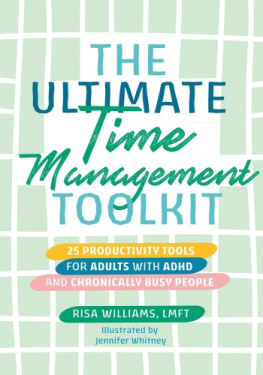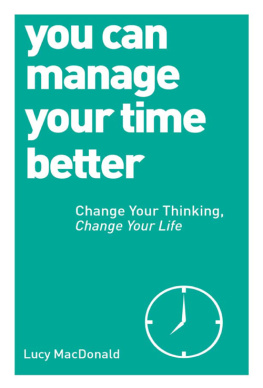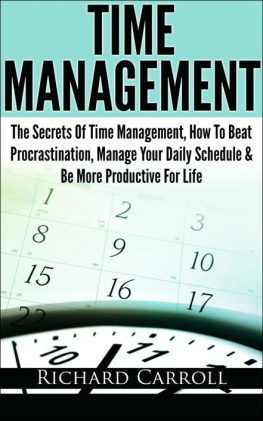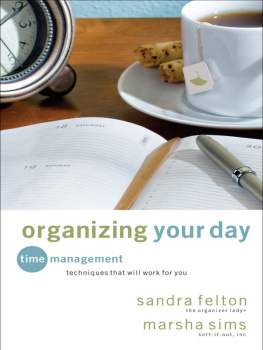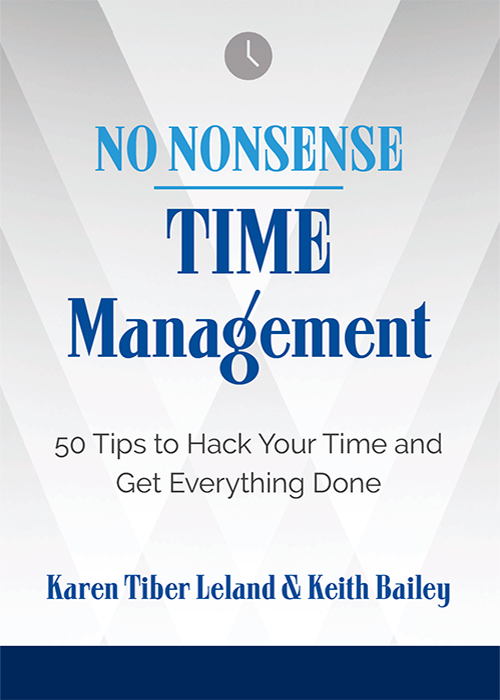
Praise for
No Nonsense: Time Management
Karen Leland and Keith Bailey have written a practical book that can transform the way you and your team think about time management. The shift from productivity as a function of time to productivity based on completion and energy management can be a game changer for the overwhelmed executive.
Asha Saxena , CEO, Coaching International and adjunct professor, Columbia University
The principles in No Nonsense: Time Management turned my world upside down and helped me realize what time management really is versus what it really isn't! So helpful!
Ben Decker , CEO, Decker Communications
Time is one of our most valuable assets and successful leaders use theirs wisely and with clarity. This book provides practical insights for leaders and their staffs to improve their effectiveness and put proven best practices to work immediately.
Vivek Bapat , senior vice president, marketing, SAP
No Nonsense: Time Management provides busy professionals with a wide array of practical tips and techniques that will help them and the organizations they run become more productive and efficient.
John Paul Rollert , Harvard Extension School
If you are going to read one book on time management, this should be the one! It has made our office more productive, efficient, and happier!
Jennifer M. Parks , president and CEO, Los Alamos National Laboratory Foundation
The techniques and tips offered in No Nonsense: Time Management are simple yet powerful! By managing the everyday distractions of life, we are able to be more present with ourselves, our teams, and our families. A must-read for any busy Mom hustling to integrate purposeful work and a meaningful life!
Jennifer Ciarimboli , founder and CEO, Studio BE


This edition first published in 2020 by Career Press, an imprint of
Red Wheel/Weiser, LLC
With offices at:
65 Parker Street, Suite 7
Newburyport, MA 01950
www.careerpress.com
www.redwheelweiser.com
www.redwheelweiser.com/newsletter
Copyright 2020 by Karen Tiber Leland and Keith Bailey
All rights reserved. No part of this publication may be reproduced
or transmitted in any form or by any means, electronic or mechanical,
including photocopying, recording, or by any information storage and
retrieval system, without permission in writing from Red Wheel/Weiser, LLC.
Reviewers may quote brief passages. Previously published in 2008, as
Time Management In an Instant by Career Press, ISBN 978-1-60163-014-8.
ISBN: 978-1-63265-177-8
Library of Congress Cataloging-in-Publication Data available upon request.
Cover design by Kathryn Sky-Peck
Interior by Steve Amarillo / Urban Design LLC
Typeset in Adobe Dapifer and Minion Pro
Printed in Canada
MAR
10 9 8 7 6 5 4 3 2 1
For Deborah, until the end of time.
Keith Bailey
To my mother and father, Norman andBarbara Tiber, who gave me the gift ofcritical thinking combined with heart.
Karen Tiber Leland
This book is dedicated to the memory of JohnGarner, our mentor and friend, who toldus many years ago that you can't managetime, you can only manage your energy.
Contents
Introduction
In the late 1980s, the phrase work-life balance began to appear around office water coolers and cubicles everywhere. Today, it's a staple of business books, consulting gurus, and television talk shows. Work-life balance describes the relationship between career achievement (getting ahead, being productive, professional accomplishment) and personal fulfillment (family, friends, hobbies, contribution). But despite all the hype, the last two decades have seen an increase in the average work week from 43.6 hours to 47.1 hours. In addition, a 2019 study from Rescue Time on work-life balance reported that:
- 21% of working hours are spent on entertainment, news, and social media.
- 28% of workers start their day before 8:30 AM (and 5% start before 7:00 AM).
- 40% of people use their computers after 10:00 PM.
- 26% of work is done outside normal working hours.
For many people, the problem is a catch-22: If you spend more time on your personal life, your work falls behind. But if you spend too much time at the office, your family life and sense of well-being can suffer. Although we don't believe there is a single solution, we do believe that learning to manage time and energy makes a substantial difference in achieving a healthy worklife balance.
The smart solutions, powerful habits, and proven time hacks given in this book come from time-management workshops we have led for corporations over the past thirty years, tens of thousands of employee-attitude surveys we have conducted, a review of the most recent research by some of the leading behavioral scientists in the field, and up-close observations of our clients as they learn to be more productive while balancing their careers and personal lives.
But before jumping in, we think it's essential to acknowledge the great debt we owe to the giants of time management who have come before us. We can all learn how to make the most of our day from these masters.
Learn from the Masters
Throughout history, great philosophers, business masterminds, and even presidents have pondered the question: How can I best use my time? Their answers underlie many of the ways we think about time today. Here are just a few.
The Psychologist
In 1943, Abraham Maslow wrote his famous paper A Theory ofHuman Motivation. Maslow's idea was that people are most able to cope with the larger issues of their lives (i.e., achievement, creativity, problem-solving) when their fundamental needs (food, warmth, shelter, safety) are taken care of. This hierarchical view of human needs inspired the POSEC method.
- Prioritize your time according to the goals that you want to accomplish in life. If you start by knowing where you want to go, it's easier to get there.
- Organize yourself by creating structures that allow you to meet your basic need to feel stable and secure in both your finances and your family. This may mean setting up a regular Friday-night dinner with your family or having a certain percentage of your paycheck automatically deposited to a savings account.
- Streamline the things that you have to do, but don't necessarily like to do (like chores), by simplifying them or making them more efficient. For example, do all your routine errands (bank deposit, post office, grocery store) in one outing, rather than in separate trips.
- Economize by reducing the amount of time and energy you invest in things that are not urgent and that you view as a low priority. For example, you may want to clean out your desk, but don't need to spend a whole day doing it.
- Contribute by giving your time and energy back to the community through a charity or a good cause. Many people find that, when they have prioritized, organized, streamlined, and economized, they have a natural inclination to contribute to a larger purpose.
The Business Guru
Stephen Covey, in his best-selling book
Next page
